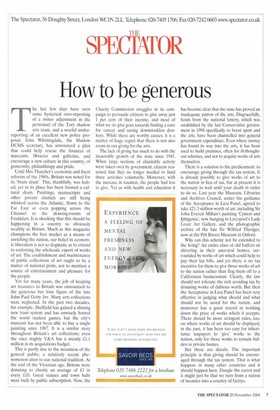How to be generous
The last few days have seen some hysterical over-reporting of a minor adjustment in the personnel of the Tory shadow arts team, and a woeful underreporting of an excellent new policy proposal. John Whittingdale, the Shadow DCMS secretary, has announced a plan that could help rescue the finances of museums, libraries and galleries, and encourage a new culture in this country, of generosity, philanthropy and pride.
Until Mrs Thatcher's economic and fiscal reforms of the 1980s, Britain was noted for its 'brain drain'. This, thankfully, was halted, yet in its place has been formed a cultural drain. Paintings, manuscripts and other private chattels are still being whisked across the Atlantic, flown to the Far East or even popping across the Channel to the drawing-rooms of Frankfurt. It is shocking that this should be happening in a country so obviously wealthy as Britain. Much as this magazine champions the free market as a means of enriching the nation, our belief in economic liberalism is not so dogmatic as to extend to endorsing the wholesale export of works of art. The establishment and maintenance of public collections of art ought to be a matter of national pride, not to mention a source of entertainment and pleasure for the people.
Yet for many years, the job of keeping art treasures in Britain was outsourced to the generous but lone figure of the late John Paul Getty I'm% Many arts collections were neglected. In the past two decades, for example, Sheffield has gained a shining new tram system and has unwisely hosted the world student games, but the city's museum has not been able to buy a single painting since 1987. It is a similar story throughout Britain's art collections; even the once mighty V&A has a measly £1.1 million in its acquisitions budget.
This is partly due to the meanness of the general public; a relatively recent phenomenon alien to our national tradition. At the end of the Victorian age, Britons were donating to charity an average of il in every £10. Great statues and town halls were built by public subscription. Now, the Charity Commission struggles in its campaign to persuade citizens to give away just 1 per cent of their income, and most of what we do give goes towards finding a cure for cancer and saving downtrodden donkeys. While these are worthy causes, it is a matter of huge regret that there is not also room in our giving for the arts.
The lack of giving has much to do with the inexorable growth of the state since 1945. When large sections of charitable activity were taken over by government, citizens reasoned that they no longer needed to fund these activities voluntarily. Moreover, with the increase in taxation, the people had less to give. Yet as with health and education it has become clear that the state has proved an inadequate patron of the arts. Disgracefully, funds from the national lottery, which was established by the last Conservative government in 1994 specifically to boost sport and the arts, have been channelled into general government expenditure. Even where money has found its way into the arts, it has been used to build premises, often for ill-thoughtout schemes, and not to acquire works of arts themselves.
There is a solution to the predicament: to encourage giving through the tax system. It is already possible to give works of art to the nation in lieu of tax, but at present it is necessary to wait until your death in order to do so. Last year the Museum, Libraries and Archives Council, under the guidance of the Acceptance in Lieu Panel, agreed to take £21.3 million worth of art, including Sir John Everett Millais's painting `Cymon and iphigenia', now hanging in Liverpool's Lady Lever Art Gallery, and the photographic archive of the late Sir Wilfred Thesiger, now at the Pitt Rivers Museum in Oxford.
Why can this scheme not be extended to the living? An entire class of old buffers sit shivering in their ancestral homes, surrounded by works of art which could help to pay their tax bills, and yet there is no tax incentive for them to give those works of art to the nation rather than flog them off to a Californian businessman. Clearly, the law should not tolerate the rich avoiding tax by donating works of dubious worth. But then the Acceptance in Lieu Panel has been very effective in judging what should and what should not be saved for the nation, and moreover has a good record in working down the price of works which it accepts. There should be more stringent rules, too, on where works of art should be displayed; in the past, it has been too easy for inheritance taxpayers to 'give' works to the nation, only for those works to remain hidden in private homes.
But these are details. The important principle is that giving should be encouraged through the tax system. That is what happens in many other countries and it should happen here. Dangle the carrot and it might just be that we turn from a nation of meanies into a country of Gettys.


























































































 Previous page
Previous page